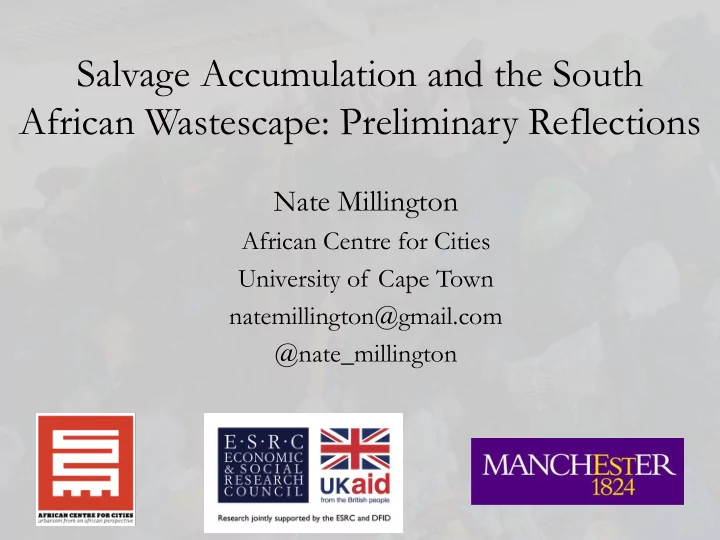

Salvage Accumulation and the South African Wastescape: Preliminary Reflections Nate Millington African Centre for Cities University of Cape Town natemillington@gmail.com @nate_millington
“The whole waste pyramid that everyone is talking about has nothing to do with the environment. It is purely driven by financial drivers. And the second you understand that, you can start making changes.” (South African Energy CEO, personal interview, 2017). In the highly developed economies of the future, it is probable that cities will become huge, rich and diverse mines of raw materials…. The largest, most prosperous cities will be the richest, the most easily worked, and the most inexhaustible mines. Jane Jacobs (1969: 108; Cited in Labban, 2014).
What I did with plastic was that I quickly learned to grade it. I followed the metal. I started grading the plastic and how I brought it in - certain grades we don't even bother. We only bought the real good stuff. And that’s basically how the system works, and today it still works that way. Plastics Recycler, 2018
If you're sorting on a belt and you, your waste percentage is too low, then it’s actually your labor input becomes very expensive. So if you're standing here at the end of the belt and you see there’s no recyclable material going over the belt then you can be pretty sure that your labor input is very very expensive because then you're moving the belt slow enough for everyone to be able to pick everything off…. There is an optimal sort of wastage percentage so that if you want to have a good or sort of accepable production costs you need to accept that there is a certain waste percentage or percentage of material that will go over the belt. MRF Operations Manager, 2017
Cape Town: Think Twice
...the recycling industry was largely resting on the recovery rates of your informal waste pickers. Now you find it more formalized at the cities and municipalities are actually now putting in place drop offs and your two bags system etcetera, but it’s not…fully implemented in the city of Cape Town. It’s probably because of the system that they are using, because they are paying a company to collect that ourselves…. So it becomes very expensive for them to roll out this model, this methodology. So they have not implemented in all areas. Then it’s also racialized because it is basically in your so called previously white areas. Western Cape Province Official, 2018
Pack-a-Ching
Capturing Extracting value from Incentivising greater waste: free, low-paid, volumes/pro Recycling, cleaning, independent portions of household waste labour recyclable management material
Who subsidizes waste?
I wouldn’t say I use the recycling as a loss -leader, but it is a nice way to hook a client, to get a total account. Recycling and dry collections is all about volume, and your transport kills you. Its costing you a thousand rand to take a bakkie and a trailer on a 50 kilometer radius. If you don’t bring in 1.5 tonnes in a load then you're not making money. Because it costs you 890 rand a tonne to process that stuff [Labour, Repairs and Maintenance, Electricity, as well as your disposal costs because you've got tailings]. Waste CEO, 2018.
Thank you! Nate Millington African Centre for Cities University of Cape Town natemillington@gmail.com @nate_millington
Recommend
More recommend